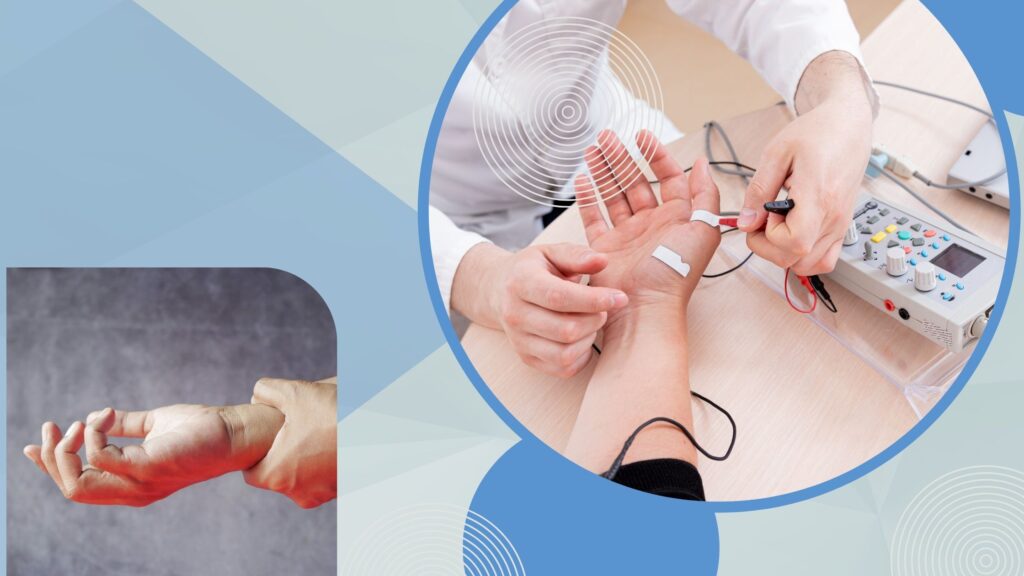If you’re experiencing unexplained tingling, numbness, muscle weakness, or pain, your doctor might recommend a test called an EMG — short for electromyography. An EMG test is used to test nerve function and response. It is critical in assessing nerve function to evaluate nerve damage or nerve disorders that may affect fine motor skills, movement, sensation, and pain.
EMG testing in Maryland can help local patients find the root of their problem or discomfort, be evaluated for disorders or illnesses, and create a care plan that helps them find relief and regain control of a better quality of life.
Learn more about EMG testing and the nerve disorders it can help diagnose. If you’re ready for your EMG test, contact Neuro Med PA today.
What Does an EMG Test Do?
An EMG test evaluates the health of muscles and the nerves that control them. EMG testing checks how well the nerves are sending signals to your muscles. This assessment helps doctors understand whether a problem originates in the muscles, the nerves, or both. By pinpointing where the signal is being distorted, an appropriate diagnosis and care plan can be made.
EMG and NCT Testing
An EMG is often paired with Nerve Conduction Studies (NCT)—another diagnostic tool used by neurologists that measures how fast and how well your nerves can transmit electrical signals. Together, these tests give a comprehensive picture of your neuromuscular function.
If you are scheduled for an EMG test in Maryland, you may also be scheduled to undergo an NCT study for the most well-rounded view of what is happening within the body.

When Is EMG Testing Recommended?
EMG testing is recommended when patients have discomfort or unexplained sensations in their nerves. Your doctor may refer you to a neurologist for comprehensive testing that helps determine the root diagnosis and how to create a treatment plan.
If you experience any of these symptoms, you may qualify for nerve testing:
- Muscle weakness or cramping
- Persistent numbness or tingling
- Unexplained pain in the arms or legs
- Limb or facial twitching
- Loss of muscle function
- Symptoms that worsen at night
What Could the Results of an EMG Mean?
By identifying where the problem lies—whether in the muscle, the nerve, or the nerve root—an EMG can help your doctor make a more accurate diagnosis and guide treatment options. Your neurologist and primary care doctor will discuss your symptoms and possible outcomes while evaluating you for the test.
Most physicians will wait until they have the results for a final diagnosis. Always talk to your doctor about your questions and concerns, but remember not to jump to any conclusions until you have all the information and can start making a formal care plan for any diagnosis.
An EMG May Detect:
- Carpal tunnel syndrome
- Sciatica
- Neuropathy
- Muscular dystrophy
- Peripheral neuropathy (often linked to diabetes or injury)
- Pinched nerves (commonly from herniated discs or spinal stenosis)
- Motor neuron diseases (like ALS)
- Muscle inflammation or disorders
- Cervical or lumbar radiculopathy

How Does an EMG Test Work?
1. Nerve Conduction Study (NCT)
An NCT test is performed by placing small electrodes on the skin. These electrodes send mild electrical pulses through your nerves. Your body’s response is recorded to see how fast and effectively the signals travel. The test is not painful, but there may be some discomfort or sensations. Patients are encouraged to wear loose fititng clothing and avoid lotions on the skin for the most accurate reading.
2. Needle EMG
The EMG test involves inserting a very thin needle electrode directly into specific muscles. It measures electrical activity while the muscle is at rest and during contraction. Although the idea of needles may cause some anxiety, most patients describe the discomfort as minor and manageable.
What to Expect Before, During, and After Nerve Testing
Most EMG tests are done on an outpatient basis and usually take between 30 to 90 minutes, depending on how many areas are being tested. Your doctor will give you the length of your appointment and how to prepare.
Before the test: No special preparation is typically required, but your provider may ask you to avoid lotions or creams on the day of your appointment for the most accurate results and to not interfere with the electrodes or needles.
During the test: You may feel a mild tingling during the nerve conduction portion and a brief pinch during the needle EMG. Most people find nerve testing tolerable.
After the test: You may have mild muscle soreness or bruising for a short time, especially around the needle insertion sites, but most people return to normal activities right away.

Why EMG Testing Matters for Patients in Maryland
At care centers like Neuromed PA in Maryland, EMG and nerve testing offer a safe, reliable way for patients to diagnose the cause of their symptoms. Whether you’ve been dealing with chronic discomfort or a sudden change in mobility or sensation, EMG testing can help bring determine a diagnosis and help structure a care plan.
Because nerve conditions often develop slowly—or mimic other health issues—having access to accurate, timely testing close to home is essential. Maryland patients can benefit from local access to two offices from Neuromed PA: one in Greenbelt and one in Laurel.
Our experienced neurologists understand how to interpret EMG results in the context of your complete health picture and work with your primary care doctor for a well-rounded treatment plan.
When Should You Talk to a Doctor About EMG Testing?
If you’ve been experiencing muscle weakness, tingling, or chronic pain and haven’t gotten answers, it may be time to ask your doctor about EMG testing. Early detection of nerve disorders or nerve damage can lead to earlier treatment—and potentially prevent long-term complications from undiagnosed nerve damage.
Compassionate Care for Your Nerve Health
Living with undiagnosed nerve issues can feel frustrating and uncertain. At Neuromed PA, we believe that every patient deserves clear answers and compassionate care. We work closely with our patients, speak in clear terms, and answer all questions about what comes next.
Our EMG and nerve testing services in Maryland are designed to be as comfortable, informative, and effective as possible. If you or a loved one are seeking answers to muscle or nerve-related symptoms, don’t wait. Reach out today to schedule your evaluation and take the first step toward feeling better.

Neurological Medicine, P.A.
Neurological Medicine, P.A., provides comprehensive diagnostic and treatment services to patients with conditions affecting the brain, spinal cord, nerves, and muscles. We have been serving the Prince George’s and Montgomery County area since 1975, with two offices: Greenbelt and Laurel. We offer complete adult neurological care as well as in-office neurodiagnostic studies.
- Neurological Medicine, P.A.
- Neurological Medicine, P.A.
- Neurological Medicine, P.A.
- Neurological Medicine, P.A.



